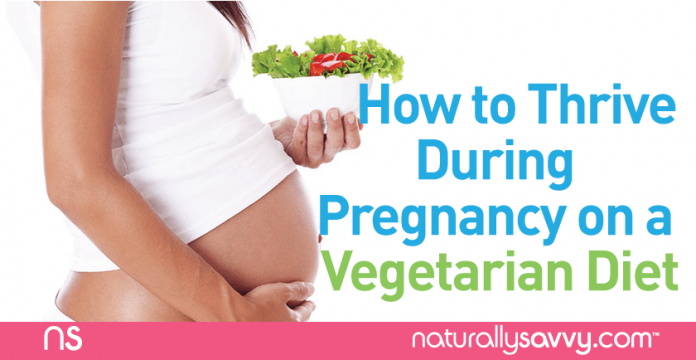
Vegetarianism is a way of life for health, ethical, or religious reasons, but what should pregnant vegetarians do? Contrary to what worrying relatives or friends may believe, a healthy vegetarian pregnancy is indeed possible. As long as a vegetarian mom has all her nutrient requirements covered, her likelihood of having a strong and healthy baby is equal to, and in some cases may even be superior to, that of her meat-eating peers.
For the most part, healthy vegetarians may continue to eat as they have been as long as they make room for the increased nutrient demands a growing baby will places on them. However, eating a vegetarian diet may require a bit more attention because meat and fish are abundant in certain vitamins required for pregnancy (B12, iron, and zinc). Proper nutrient balance is possible to achieve with adequate planning and sufficient variety of food choices.
Iron needs increase during pregnancy from about 18 mg to approximately 27 mg daily.
A mother’s blood volume increases at this time (almost double her regular levels) to provide adequate oxygen to the fetus. Iron is required for this increase because it is essential in the formation of hemoglobin, a substance required to carry oxygen to the body’s tissues and organs. Non-heme iron (found in vegetables) is less well absorbed than heme iron (found in meat) thus vegetarians need to be conscious of both getting an adequate supply and maximizing absorption. High non-heme iron foods such as eggs, beans, tofu, dried figs and apricots, whole grains and green leafy vegetables should be included in the diet alongside vitamin C rich foods to boost absorption.
Vitamin B12 is essential for cell division, healthy red blood cell formation and protein synthesis.
Since B12 exists only in animal foods, vegetarians run an increased risk of being deficient in this nutrient. B12 exists in eggs and dairy products and therefore, if tolerated, these foods should be included in the diet. If allergies or aversions prohibit their consumption, consider getting a B12 shot through your doctor or naturopathic doctor. B12 absorption is much higher through injections than through tablet form. During pregnancy eight to 10 mcg per day is recommended.
To enable proper growth and development during pregnancy, your new baby needs zinc.
Zinc is important for proper cell division and utilization of protein obtained through the placenta. Zinc deficiency correlates with birth defects in animal experiments. Zinc requirements during pregnancy are about 15 to 20 mg daily. Good vegetarian sources of zinc include beans, brown rice, pumpkin seeds, sunflower seeds, nuts (Brazil nuts and pecans), tofu, egg yolks, and dairy products. Sprouted grains increase the availability of zinc.
Other Vitamins to Consider
While Iron, vitamin B12 and zinc are essential, vitamin D and folate are also important to fetal health.
Vitamin D
The body, with healthy exposure to sunlight, can produce it. Spend 15 minutes daily outdoors without any sun-block on. If you live in a more northern area, where sunlight is limited through the October to April months, include vitamin D rich foods such as fortified milk and eggs in your diet. Otherwise supplementing may be a good idea. Current recommendations for vitamin D range from 400 to 1,000 IU per day.
Folic Acid
Although vegetarian diets are often high in folic acid, or folate, it is still important for pregnant women to ensure they receive enough of this nutrient because it tends to be a common vitamin deficiency in North America. Folic acid is crucial for proper cell growth and division in the fetus. Deficiencies can lead to neural tube defects. Experts recommend 600 to 1,000 mcg per day during pregnancy from folic acid supplements and/or the following dietary sources: dark leafy greens, whole grains, orange juice, broccoli, cauliflower, green beans, and fortified cereals.
A good quality, food-based pre-natal supplement also helps ensure these nutrients are obtained in optimal amounts.
Foods for Pregnancy
Protein-Rich Foods
Pregnant women are encouraged to consume between 60 to 75 grams of protein (depending on their size) in the form of legumes, nuts, seeds, eggs, and various milks. High quality protein powders may also be consumed. Ensure they are free of artificial sweeteners, such as aspartame and sucralose (Splenda), as well as large amounts of sugars.
Protein amounts in foods:1 egg –> 6 grams
1 cup beans –> 11-18 grams
1 cup of yogurt –> 13 grams
2 tbsp nut butter –> 8 grams
1 cup quinoa –> 9 grams
Protein shake –> 25 gramsFruits and Vegetables
Pregnant women should consume about eight to 10 servings of fruits and vegetables, with more vegetable than fruit servings. Vegetable juicing and smoothies are easy ways to get in extra servings. If this proves to be a big challenge, you can also include a greens drink powder in your day to boost vegetable intake. Eating organic produce will also help avoid chemicals.
Calcium-Rich Foods
It is recommended during pregnancy that women consume four servings of calcium-rich foods. If dairy is tolerated, consume at least one serving of plain yogurt with active bacterial cultures. Other sources of calcium include dark green leafy vegetables like collard greens, kale, broccoli, almonds and almond milk, sesame seeds and tahini, organic soybeans and tempeh, sea vegetables and black strap molasses. Interestingly calcium absorption increases to almost double during pregnancy.
Grains
Eight to nine servings of grains are suggested during pregnancy. Try to include a variety of whole grains such as brown rice, whole oats, quinoa, rye, barley, spelt, and kamut. Keep in mind that a serving size of grains is about one-half cup, one small slice of bread, or six whole grain crackers.
It is very possible to eat a healthy vegetarian diet during pregnancy. Make sure that all of your nutritional requirements are being met by including these foods and supplements, as well as lots of variety.
[Editor's Note: We love the high-quality prenatal supplements from our partner Happy Family.]










